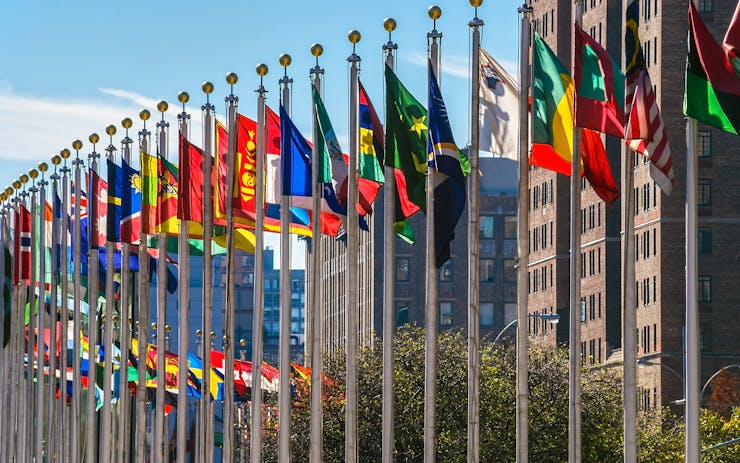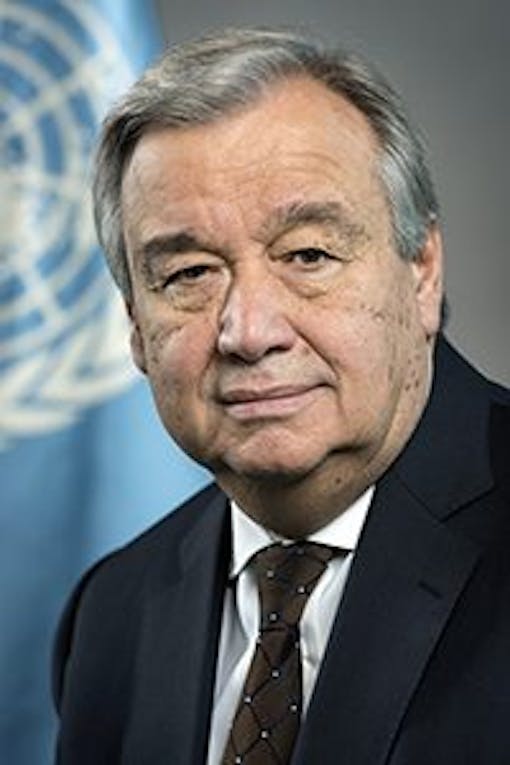The United Nations International Narcotics Control Board (INCB) recently issued its 2017 annual report, and the takeaway with regard to cannabis is clear: The INCB is deeply concerned with the spread of adult-use legalization.
Countries pursuing legalization are acting in 'clear violation' of the UN's 1961 Single Convention on Narcotic Drugs, says the International Narcotics Control Board.
The report contains stern warnings, accusing countries like Uruguay of acting in “clear violation” of global drug control accords.
The Board, which monitors compliance with international drug control treaties, is made up of individuals, not U.N. member states. That’s meant to protect it from political pressure. The Board’s charter also stipulates, however, that it must include individuals with “medical, pharmacological or pharmaceutical experience.” That means Big Pharma is well represented, while advocates for cannabis legalization—whether medical or adult-use—have no seat at the table.
International drug control treaties, signed by most member states decades ago, are meant to prohibit the proliferation and non-medical use of of dangerous drugs. Cannabis is specifically covered under most of the treaties.
However, in recent years countries like Uruguay have legalized and regulated the non-medical use of cannabis. Canada is planning to legalize later this year. In the United States, nine states and the District of Columbia have implemented some form of adult-use legalization.
That does not sit well with the INCB. “Governments and jurisdictions in North America have continued to pursue policies with respect to the legalization of the use of cannabis for non-medical purposes, in violation of the 1961 Convention as amended,” states the Board’s 2017 report.
Warnings to Uruguay, Jamaica
The Board strongly cautioned Uruguay, which legalized cannabis nationally in 2013, and currently sells cannabis in pharmacies, that the nation is “acting in clear violation” of the drug treaties.
“The limitation of the use of controlled substances to medicinal and scientific purposes is a fundamental principle to which no derogation is permitted under the 1961 Convention as amended,” the INCB report says.
The U.N. board members also criticized Jamaica for legalizing cannabis for religious use three years ago. Cannabis is considered a religious sacrament among adherents of the Rastafarian religion. Rastafarians take their spiritual name from Ras Tafari Makonnen Woldemikael, (Emperor Haile Selassie I, of Ethiopia). Selassie is considered a direct descendent of King Solomon.
While the U.N. claims to promote global religious tolerance, the INCB strongly disagrees with the religious nature of the rasta cannabis ceremony.
“The Board reminds the Government of Jamaica, and all other parties, that under article 4, paragraph (c), of the 1961 Convention as amended, only the medical and scientific use of cannabis is authorized, and that use for any other purposes, including religious, is not permitted,” the report states.
Wagging a Finger at the US and Canada
Sternly-worded admonishments were also issued to North American member states, suggesting that their state and national policies provided a gateway for drug traffickers.
Cannabis decriminalization has led organized criminal groups to focus on manufacturing other illegal drugs, says the report. (But isn't that a good thing?)
“The situation pertaining to cannabis cultivation and trafficking in North America continues to be in flux, owing to the widening scope of personal non-medical use schemes in force in certain constituent states of the United States,” the report said. “The decriminalization of cannabis has apparently led organized criminal groups to focus on manufacturing and trafficking other illegal drugs, such as heroin.”
It is unclear why the INCB considers that to be a harmful turn of events. It has been well documented that organized criminal groups have shifted to trafficking other drugs because trafficking cannabis is no longer as profitable.
Shop highly rated dispensaries near you
Showing you dispensaries nearThe INCB report confirms that medical marijuana is permitted under international drug control conventions. Member states, the report said, are expected to keep a tight lid on their medical marijuana programs to “ensure that cannabis is prescribed by competent medical practitioners according to sound medical practice, and based on sound scientific evidence.”
No Homegrow, Says the Board
The Board drew the line at home grown cannabis, though, arguing that the international conventions do not allow medical marijuana patients to cultivate the plant for personal use.
The bylaws of those conventions, the INCB said, “require [member] states providing for the use of cannabis for medical purposes to establish a national cannabis agency to control, supervise and license its cultivation.
The report continued:
“Such agencies must designate the areas in which the cultivation of cannabis is permitted, ensure the licensing of producers; purchase and take physical possession of stocks, and maintain a monopoly on wholesale trading and maintaining stocks.”
“States must take measures to prohibit the unauthorized cultivation of cannabis plants, to seize and destroy illicit crops, and to prevent the misuse of and trafficking in cannabis. Similarly, the Board wishes to draw the attention of all Governments to its previously stated position that personal cultivation of cannabis for medical purposes is inconsistent with the 1961 Convention as amended because, inter alia, it heightens the risk of diversion.”
The Board also went after Canada.
“The Board notes with concern that, in Canada, draft legislation intended to authorize and regulate the nonmedical consumption of cannabis was introduced in the House of Commons in April 2017,” the report stated. “As the Board has repeatedly stated, if passed into law, provisions of Bill C-45, which permit the non-medical and non-scientific use of cannabis would be incompatible with the obligations assumed by Canada under the 1961 Convention as amended.”
Warning the UK but not Portugal
In the past, the INCB has taken aim at Great Britain for rescheduling cannabis, claiming it would have “worldwide repercussions.”
“The reclassification of cannabis by the Government of the United Kingdom would undermine the efforts of the Governments of African countries to counter illicit cannabis cultivation, trafficking, and abuse,” the INCB warned. “That action, it was held, sent the wrong message, and could lead to the increased cultivation of cannabis destined for the United Kingdom and other European countries,” their previous report stated.
Curiously though, the Board did not follow suit in criticizing Portugal, which was not mentioned in the new report, despite having completely decriminalized all forms of drug use. The current U.N. Secretary-General, Antonio Manuel de Oliveira Guterres, is Portuguese, and served as the country’s prime minister when decriminalization was enacted.
Like several other U.N. “governing bodies,” the INCB does not have the staffing or authority to enforce their directives. They function in a mostly advisory, quasi-judicial capacity.
Technically, there is the possibility of another country bringing Canada or Uruguay before the International Court of Justice. Additionally, legalization could theoretically impede either country’s opportunity for a seat on the United Nations Security Council—although either scenario is unlikely.






